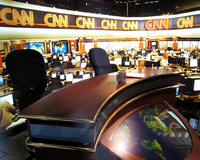The CNN effect is alive and well in 2011, even if its 2.0 incarnation might now be labeled the Al-Jazeera effect. The fact that U.S. President Barack Obama and British Prime Minister David Cameron are now talking about a "full spectrum of possible responses" to support the opposition to Libyan leader Moammar Gadhafi and NATO is considering endorsing a "no-fly zone" over the embattled North African state -- even as the war in Afghanistan rages and Iraq is far from settled -- testifies to the ongoing power of the global media to drive even a superpower's foreign policy agenda. But although intervening on behalf of regime change in Libya has grabbed the attention of the commentariat, no such calls are heard for America to defend democracy just a bit further to the south and west, in the Ivory Coast, where a democratically elected president, Alassane Ouattara, has been unable to compel his predecessor, Laurent Gbagbo, to transfer power. Gbagbo's militias are using no less violent methods to hold on to power, but because the dramatic images have yet to saturate our television screens, pundits have not seen fit to gravely warn how Obama's "failure" to act jeopardizes U.S. global leadership.
There is a case to be made for U.S. intervention in Libya. My problem, however, is with the knee-jerk reaction of the foreign policy establishment to proclaim every new televised crisis as the "test" of whether America remains a global leader or whether the president, by not immediately dispatching U.S. military forces, is abdicating his responsibilities to defend U.S. interests and the U.S.-led international order. Indeed, stepping back to observe the big picture over the past six months, what is striking is the utter and complete incoherence of expert commentary on what America's interests are and what role the U.S. should be playing in the world.
Last summer, Iran was the looming threat. The Bushehr reactor was coming on line, and the likelihood of the Islamic Republic crossing the nuclear finish line -- and Obama's "failure" to prevent this from occurring -- led to calls for the U.S. to "do more in Iran!" Then, in short order, we had a war scare with North Korea, with pundits darkly warning that the restraint showed by both Seoul and Washington in responding to Pyongyang's provocations was nothing short of appeasement. The attack by drug cartels on a U.S. couple jet-skiing on a lake on the U.S.-Mexico border then suddenly refocused attention on an "undefended" southern border and the spillover effect of Mexico's narco-insurgency -- with the commentariat questioning why the administration wasn't doing more in America's backyard. Then the federal debt became the "threat du jour": America was bankrupting itself with its overseas commitments. Concerns about the federal government drowning in a sea of red ink were apparently so acute that even Tea Party conservatives were supporting a massive reduction in the size and scope of the U.S. mission in Afghanistan: Just two short months ago, two-thirds of self-described Tea Party supporters agreed with the proposition that U.S. interests would be best served by downsizing the American presence or leaving Afghanistan altogether. This distaste for overseas involvement, however, seemed to evaporate with the murder of four Americans on board the Quest in the waters off Somalia, resulting in calls for robust action against Somali pirates, including carrying the fight back to the shore. Of course, the Quest incident was soon relegated to footnote status as Libya coverage came to dominate the airwaves.

